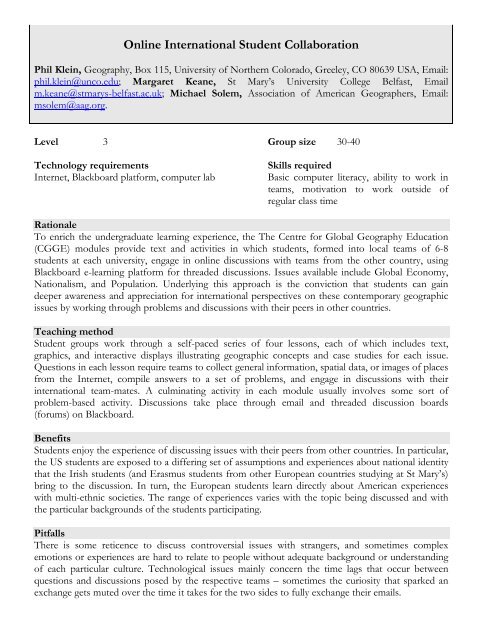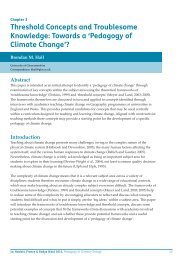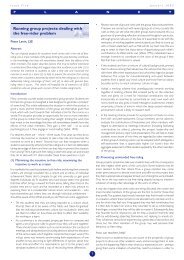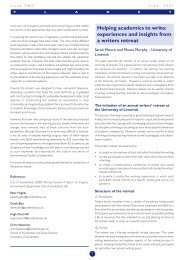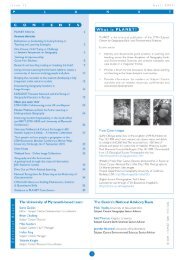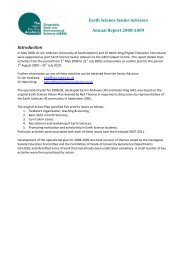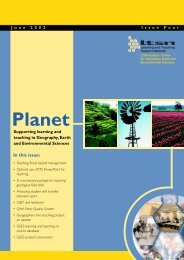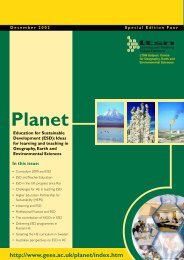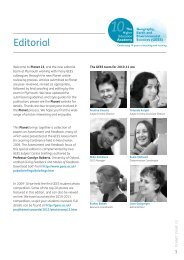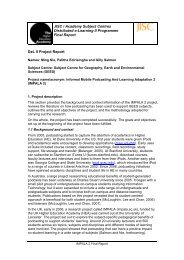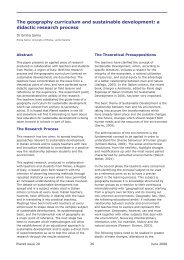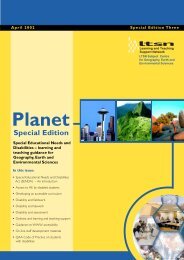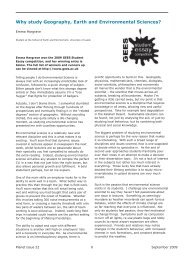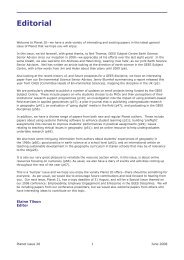Online International Student Collaboration
Online International Student Collaboration
Online International Student Collaboration
You also want an ePaper? Increase the reach of your titles
YUMPU automatically turns print PDFs into web optimized ePapers that Google loves.
<strong>Online</strong> <strong>International</strong> <strong>Student</strong> <strong>Collaboration</strong><br />
Phil Klein, Geography, Box 115, University of Northern Colorado, Greeley, CO 80639 USA, Email:<br />
phil.klein@unco.edu; Margaret Keane, St Mary’s University College Belfast, Email<br />
m.keane@stmarys-belfast.ac.uk; Michael Solem, Association of American Geographers, Email:<br />
msolem@aag.org.<br />
Level 3<br />
Technology requirements<br />
Internet, Blackboard platform, computer lab<br />
Group size 30-40<br />
Skills required<br />
Basic computer literacy, ability to work in<br />
teams, motivation to work outside of<br />
regular class time<br />
Rationale<br />
To enrich the undergraduate learning experience, the The Centre for Global Geography Education<br />
(CGGE) modules provide text and activities in which students, formed into local teams of 6-8<br />
students at each university, engage in online discussions with teams from the other country, using<br />
Blackboard e-learning platform for threaded discussions. Issues available include Global Economy,<br />
Nationalism, and Population. Underlying this approach is the conviction that students can gain<br />
deeper awareness and appreciation for international perspectives on these contemporary geographic<br />
issues by working through problems and discussions with their peers in other countries.<br />
Teaching method<br />
<strong>Student</strong> groups work through a self-paced series of four lessons, each of which includes text,<br />
graphics, and interactive displays illustrating geographic concepts and case studies for each issue.<br />
Questions in each lesson require teams to collect general information, spatial data, or images of places<br />
from the Internet, compile answers to a set of problems, and engage in discussions with their<br />
international team-mates. A culminating activity in each module usually involves some sort of<br />
problem-based activity. Discussions take place through email and threaded discussion boards<br />
(forums) on Blackboard.<br />
Benefits<br />
<strong>Student</strong>s enjoy the experience of discussing issues with their peers from other countries. In particular,<br />
the US students are exposed to a differing set of assumptions and experiences about national identity<br />
that the Irish students (and Erasmus students from other European countries studying at St Mary’s)<br />
bring to the discussion. In turn, the European students learn directly about American experiences<br />
with multi-ethnic societies. The range of experiences varies with the topic being discussed and with<br />
the particular backgrounds of the students participating.<br />
Pitfalls<br />
There is some reticence to discuss controversial issues with strangers, and sometimes complex<br />
emotions or experiences are hard to relate to people without adequate background or understanding<br />
of each particular culture. Technological issues mainly concern the time lags that occur between<br />
questions and discussions posed by the respective teams – sometimes the curiosity that sparked an<br />
exchange gets muted over the time it takes for the two sides to fully exchange their emails.
Evidence of effectiveness<br />
Largely qualitative evidence from student reactions to an informal questionnaire administered after<br />
the experience. A more detailed evaluation of the full CGGE program was undertaken during the<br />
project’s formal trials in 2004-05, involving both quantitative evaluations, field observations, and<br />
detailed questionnaires of faculty participating in the trials. Results of the trials are presented in a<br />
manuscript currently under review for the Journal of Geography in Higher Education.<br />
Advice to others<br />
Try it. It’s an interesting experience for both faculty and students. Takes some time to set up the<br />
logistics and considerable monitoring of student progress, but it’s a valuable experience.<br />
References:<br />
CGGE modules are available at http://www/aag/org/education/center<br />
Full copy of evaluation report is also linked to this website. Manuscript summarizing the field trials is<br />
found in Klein, P., and Solem, M. (2008) Evaluating the Impact of <strong>International</strong> <strong>Collaboration</strong> on<br />
Geography Learning. Journal of Geography in Higher Education, 32, (2), p245-267


